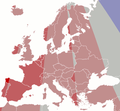Time zone
Time zone is a region of the globe that observes a uniform standard time for legal, commercial, and social purposes. Time zones tend to follow the boundaries of countries and their subdivisions instead of strictly following longitude, because it is convenient for areas in close commercial or other communication to keep the same time.
Definition[edit]
The term time zone is primarily used to describe an area of the Earth that has the same time. Each time zone is defined by the number of hours that it is offset from Coordinated Universal Time (UTC), the world's time standard. The concept was adopted during the 19th century to aid weather forecasting and train travel.
History[edit]
The concept of time zones was first proposed by Sir Sandford Fleming in the late 19th century, with the creation of the worldwide time standard known as Coordinated Universal Time (UTC). This was a result of the expansion of transport and communication during the 19th century which required a more organized time-keeping system.
Usage[edit]
Time zones are used to standardize time across countries and regions. They are crucial for maintaining the synchronization of time especially in communication, transportation, and many other fields.
Daylight Saving Time[edit]
Many countries use Daylight Saving Time (DST), where the clock is adjusted forward by one hour at the beginning of the spring and adjusted back in autumn. The practice aims to extend evening daylight and reduce the need for artificial lighting.
Time Zone Conversion[edit]
Time zone conversion is a process used to determine the time in a different zone. This is especially important for planning international meetings or travel.
See Also[edit]
-
Time_zone
-
Time_zone
-
Time_zone
-
Time_zone
-
Time_zone
-
Time_zone
-
Time_zone
-
Time_zone
-
Time_zone
-
Time_zone
Ad. Transform your life with W8MD's Budget GLP-1 injections from $75


W8MD offers a medical weight loss program to lose weight in Philadelphia. Our physician-supervised medical weight loss provides:
- Weight loss injections in NYC (generic and brand names):
- Zepbound / Mounjaro, Wegovy / Ozempic, Saxenda
- Most insurances accepted or discounted self-pay rates. We will obtain insurance prior authorizations if needed.
- Generic GLP1 weight loss injections from $75 for the starting dose.
- Also offer prescription weight loss medications including Phentermine, Qsymia, Diethylpropion, Contrave etc.
NYC weight loss doctor appointmentsNYC weight loss doctor appointments
Start your NYC weight loss journey today at our NYC medical weight loss and Philadelphia medical weight loss clinics.
- Call 718-946-5500 to lose weight in NYC or for medical weight loss in Philadelphia 215-676-2334.
- Tags:NYC medical weight loss, Philadelphia lose weight Zepbound NYC, Budget GLP1 weight loss injections, Wegovy Philadelphia, Wegovy NYC, Philadelphia medical weight loss, Brookly weight loss and Wegovy NYC
|
WikiMD's Wellness Encyclopedia |
| Let Food Be Thy Medicine Medicine Thy Food - Hippocrates |
Medical Disclaimer: WikiMD is not a substitute for professional medical advice. The information on WikiMD is provided as an information resource only, may be incorrect, outdated or misleading, and is not to be used or relied on for any diagnostic or treatment purposes. Please consult your health care provider before making any healthcare decisions or for guidance about a specific medical condition. WikiMD expressly disclaims responsibility, and shall have no liability, for any damages, loss, injury, or liability whatsoever suffered as a result of your reliance on the information contained in this site. By visiting this site you agree to the foregoing terms and conditions, which may from time to time be changed or supplemented by WikiMD. If you do not agree to the foregoing terms and conditions, you should not enter or use this site. See full disclaimer.
Credits:Most images are courtesy of Wikimedia commons, and templates, categories Wikipedia, licensed under CC BY SA or similar.
Translate this page: - East Asian
中文,
日本,
한국어,
South Asian
हिन्दी,
தமிழ்,
తెలుగు,
Urdu,
ಕನ್ನಡ,
Southeast Asian
Indonesian,
Vietnamese,
Thai,
မြန်မာဘာသာ,
বাংলা
European
español,
Deutsch,
français,
Greek,
português do Brasil,
polski,
română,
русский,
Nederlands,
norsk,
svenska,
suomi,
Italian
Middle Eastern & African
عربى,
Turkish,
Persian,
Hebrew,
Afrikaans,
isiZulu,
Kiswahili,
Other
Bulgarian,
Hungarian,
Czech,
Swedish,
മലയാളം,
मराठी,
ਪੰਜਾਬੀ,
ગુજરાતી,
Portuguese,
Ukrainian










